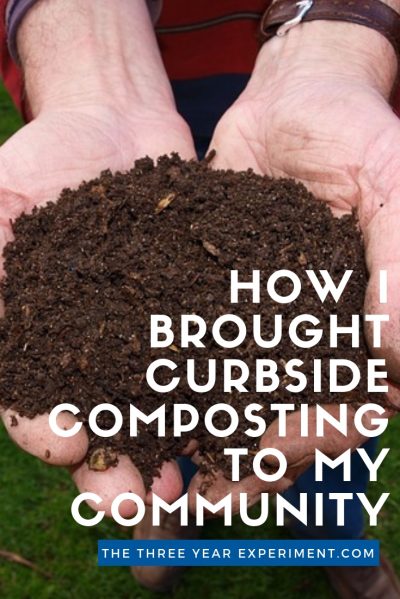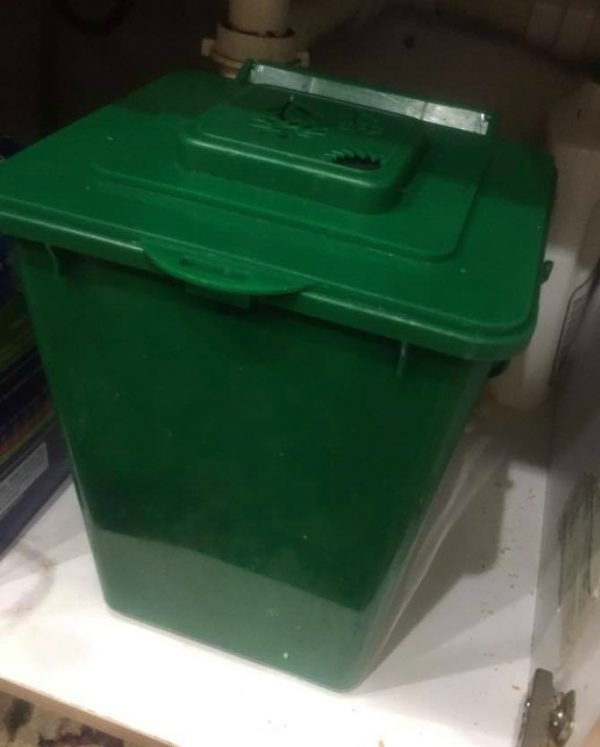I don’t talk a lot about environmental matters on this blog, but getting better with money has definitely made me think more about making waste, and my family’s impact on the earth over the years.
Angela from Tread Lightly, Retire Early offered to share our story about bringing curbside compost to our town in New Hampshire and I thought other people would want to hear how we got it set up.
Curbside compost is a service that picks up your leftover food scraps and composts them for you in an industrial facility, then brings compost back to you. It was great for my family because we could compost all of our food scraps, even meat, without worrying about bears, or composting during the winter.
Angela’s blog focuses on ways you can lessen your impact on the planet and create financial independence. Check out her personal finance roundups on Wednesdays and her Frugal Five features on Fridays, in addition to posts about the intersection of the environment and finances.

Here’s an excerpt from my post:
I’m going to make a confession, and it’s a hard one to make on this blog that is dedicated to being kinder to the earth: I’ve never been much of an environmentalist.
Yes, over the years I would half-heartedly recycle. But I never went to the trouble to wash out those pesky peanut butter jars, and if the recycling bin got too full I’d just chuck stuff right into the trash.
I didn’t even really pay much attention to the trash we made, at all, aside from getting annoyed in the summer months that it stank and attracted maggots.
But a few years ago, I stumbled upon Bea Johnson’s blog Zero Waste Home, and something about her incredible, ridiculous goal to eliminate all the trash her family produced resonated with me.
Hi, I’m Laurie, and just over two years ago, my family of four started a journey to engineer our lives to have more freedom and travel time. Six months ago, we became location independent. Along the way, we’ve worked towards financial independence, embraced minimalism, and as I just mentioned, discovered the Zero Waste movement. I document our journey towards freer living at The Three Year Experiment.
After I discovered Zero Waste Home, I still wasn’t prepared to eliminate all of our family’s waste. But I did start paying more attention to what I bought at the grocery store, bringing my own mesh bags and even jars to the store so I brought less plastic packaging home.
I even bought our family a compost bin, which we put across the expanse of our large back yard. I put a bucket under our sink, and we filled it up with food waste pretty quickly. Then I’d trudge across the yard and open the bin, using the pitchfork to turn the food scraps, and more often than not ending up with a heap of smelly stuff.
Winters were particularly hard to compost, because we had to plod across the six feet of snow in the yard (we lived in New Hampshire), brush the mound of snow off the top of the bin, and pry the icy levers on the sides open. The pitchfork was almost always frozen into the ground, so we didn’t turn the compost, instead just letting it pile up in an icy chunk.
We could never dump any kind of meat into our bin, especially in the summer, because it attracted bears and racoons. More than once, I had to put the bin back together after a bear swiped at it and split it into four pieces, scattering our food scraps across the yard.
After a year or two of this, we gave up, and sent our food waste back to the trash. Which left me with an unhappy, unsettled feeling, because I loved that we had effectively reduced the amount of trash we made by 3/4, and that we no longer had stinky, smelly bags to haul to the dump.
So when I saw a Curbside Composting booth one day at our local farmer’s market, I stopped. Jessica, the owner, talked to me a bit about what curbside composting was. “We give you a 5-gallon bucket, with a lid,” she explained, and then you take it outside to your curb once a week and we pick it up for you, leaving you a clean bucket for the following week. Oh, and you can compost anything.”
“Meat?” I asked.
“Yes, meat, egg shells, any kind of food waste…”
“Coffee grounds? The leftovers in the back of the fridge?”
“Absolutely!”
I went home to think more about it and then wrote her with a million questions. What happened to our food scraps? Were they composted? Could we get the compost? How much did this service cost? Would it smell up the house as bad as the previous compost bucket had?
To read the rest of the post, head over to Tread Lightly, Retire Early.
Thanks so much for reading and see you Friday!


